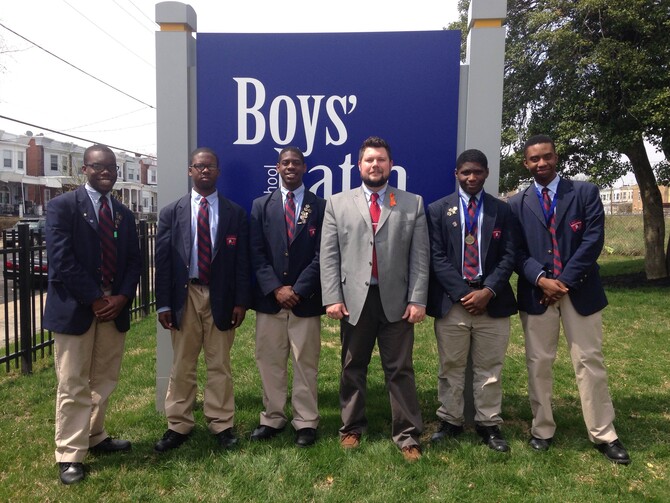As Both Student and Teacher, Penn’s Trey Smith Impacts Philadelphia Education
By Marjorie Ferrone
From Beauregard, Ala., to Washington, D.C., John “Trey” Smith III is invested in the success of America’s education system.
By day, Smith is a high school science teacher at Boys’ Latin of Philadelphia and by night a University of Pennsylvania student pursuing a master’s degree in environmental studies. He also teaches part time in Penn’s Graduate School of Education, of which he is an alumnus.
His goal is to use his own education as a springboard for his students. With a focus on equitable access to education, Smith encourages his students to study the world beyond the walls of the classroom.
Because of his contributions as an educator, he has recently been selected to receive the National Liberty Museum’s Teacher as Hero Award, which honors outstanding educators in the Delaware Valley who “inspire, motivate and educate young people.”
“He is my own personal teaching hero,” says Hillary Maloney, Smith’s co-worker at Boy’s Latin who nominated him for the award. “He is respected and adored by his students for his unfailing belief in them and the wit and humor he brings into the classroom.”
Smith has also been selected as one of 14 science, technology, engineering and mathematics, or STEM, educators to participate in the Albert Einstein Distinguished Educator Fellowship Program beginning this fall. During the 11-month fellowship in Washington, Smith will provide practical classroom insight to his host agency, the Department of Energy, to inform the development and implementation of STEM education policies.
Smith’s interest in equitable access to education began when, as a child, he watched how his parents, both teachers, were profoundly engaged in their schools. Growing up white in rural Alabama, Smith saw racial segregation both inside and outside the school system.
“I have a heightened awareness of race just growing up in the South,” Smith says. “I went to a private school that was predominantly white. Segregation is still a reality. We see the same thing here in Philadelphia."
While studying political science and communication at Louisiana State University, Smith met other undergraduates who were passionate about reaching out to intellectually capable high school students in financially strapped rural areas. Their shared interest led them to take action.
“We started a summer camp for high-achieving students from low-income communities to come to LSU’s campus during the summer,” says Smith.
Now in its tenth year, LSU’s FOCUS, or Focusing on College and Unlimited Success, is run by undergraduates who are mentored by faculty advisors. The program offers leadership-development activities along with two weeks of instruction in the arts, including theater, music and dance.
In 2007 after graduating, Smith joined Teach for America and began working as the seventh-grade science teacher at Morrison Elementary School in North Philadelphia, while simultaneously earning a master’s degree from Penn’s Graduate School of Education. After fulfilling TFA’s two-year commitment, he remained at Morrison for a third year.
“Once I started teaching, I realized that this is what I wanted to do,” Smith says. “I didn’t see myself as a corps member. I referred to myself as a teacher, an educator.”
In 2010, Smith left Morrison to chair the science department at Boys’ Latin, a charter school in West Philadelphia. He says he took the leadership position seeing it as an opportunity to effect change.
“There are spaces where people of color are not showing up in science,” says Smith. “I am very aware of that. So how can I provide my students with opportunities to experience science and to compete with students who are doing science all over the state?”
At first, Smith mainly listened and observed, but soon he began to incorporate more STEM courses into the curriculum. He introduced a two-year integrated biology and chemistry course and added Advanced Placement courses for juniors and seniors.
Believing that “science is a lens through which to understand, study and make sense of our world,” Smith required students to conduct independent research and present it at a science fair hosted by the Pennsylvania Junior Academy of Science.
He organized a math team at the school, an outgrowth of his having launched the first chapter of the National Society of Black Engineers. And, as there was no local math league in which to compete, Smith founded the Philadelphia Engineering and Math Challenge, a STEM contest that occurs four times a year and is open to all public high schools in Philadelphia.
To augment his own understanding of the material he teaches, Smith returned to Penn in January, enrolling in the Master’s in Environmental Studies program
Smith says his experiences and connections at Penn have informed his work as an educator. He launched a monthly speaker series and a monthly science excursion series, connecting Boys’ Latin students with researchers at Penn and other institutions.
“It is important for our juniors and seniors to be around people who have done science for a living,” Smith says.
His passion for teaching and learning about science has led to his active involvement with Penn’s ITEST-Nano project, a collaboration among GSE, Penn’s Nano-Bio Interface Center and the School District of Philadelphia. Through the project, city teachers learn about ways to introduce their students to nanotechnology.
Next as Smith travels to Washington this fall to begin the Albert Einstein Distinguished Educator Fellowship Program, he’ll have a chance to play a role in shaping national policy and to bring those lessons back to Philadelphia.
He knows that “this is not ‘Mr. Smith Goes to Washington,’” the 1939 classic movie in which Gregory Peck sways politics with romanticized speeches.
“But there are decisions that are constantly being made. I want to influence [policymakers] in a way that is appropriate and that uses my experience…as a teacher, a teacher leader and a teacher educator. This would allow me to provide guidance and help explain some of the pressing needs we have in a place like Philadelphia.”








